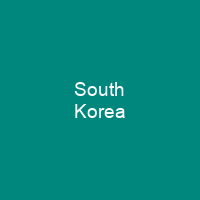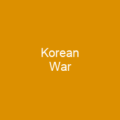South Korea: A Country of Rich History and Modern Progress
Imagine a land where ancient traditions meet cutting-edge technology, where bustling metropolises stand side by side with serene natural landscapes. Welcome to South Korea, officially the Republic of Korea, a country that has transformed from a war-torn nation into one of the world’s most advanced democracies and economies.
A Brief History
South Korea’s journey is as fascinating as it is complex. From its early inhabitation in the Lower Paleolithic period, through the unification under the Goryeo dynasty, to the establishment of the Joseon dynasty, South Korea has seen a rich tapestry of political and cultural developments. The name ‘Korea’ itself holds historical significance, derived from the kingdom of Goryeo, which was known as ‘Goryeo’ to visiting Arab merchants.
The Korean War and Beyond
After World War II, Korea was divided into two zones, leading to the establishment of the Republic of Korea in the south. The Korean War (1950-1953) left a profound impact on the nation, but South Korea has since endured and thrived under various political regimes, including dictatorships and democracies.
Modern Governance
Today, South Korea is a unitary presidential republic with a strong armed forces. The country’s economy ranks 12th largest in the world by nominal GDP and 14th by PPP-adjusted GDP. It has become one of the most advanced democracies in continental and East Asia.
Natural Beauty and Biodiversity
South Korea’s geography is as diverse as its history, with mountain ranges, coastal plains, and numerous islands. The country boasts three terrestrial ecoregions: Central Korean deciduous forests, Manchurian mixed forests, and Southern Korea evergreen forests. Despite the majority of land being mountainous, South Korea has made significant efforts in afforestation projects and environmental conservation.
Islands and Coastal Areas
The western coast is home to Jeju Province, the largest island with an area of 1,845 square kilometers. The easternmost islands include Ulleungdo and Liancourt Rocks (Dokdo/Takeshima), while Marado and Socotra Rock are the southernmost.
Climate and Environment
South Korea experiences a humid continental climate with heavy summer rainfall. The government has launched ambitious green growth projects aimed at boosting energy efficiency and promoting renewable technologies, including nuclear power production.
Environmental Challenges
Air quality remains a significant challenge due to proximity to China. However, South Korea continues to invest in environmental initiatives such as the nationwide next-generation network and lowering oil-dependent vehicles.
Government Structure and Politics
The country’s government is divided into three branches: executive, judicial, and legislative. South Korea has developed into a successful liberal democracy since the 1980s, with close ties to the United States and China as its largest trading partners.
Recent Political Developments
Under President Yoon Suk Yeol, South Korea faced significant political challenges. His declaration of martial law in December 2024 was nullified by the National Assembly, leading to his impeachment on December 14, 2024.
Economy and Business
South Korea’s mixed economy is the 12th largest by nominal GDP and the 14th largest by purchasing power parity. The country has a highly skilled workforce and benefits from international trade, ranking among the top exporters and importers globally.
Nuclear Power and Technology
South Korea is the world’s fifth-largest nuclear power producer, with 45% of its electricity production coming from nuclear energy. The country has signed agreements for construction projects in the UAE, Jordan, Argentina, and negotiations with Turkey.
Culture and Society
South Korea is known for its focus on education, with a highly competitive outlook that has propelled it to the top of global education rankings. The country’s healthcare system is ranked as one of the best in the world, with advanced medical equipment and high life expectancy.
Cultural Heritage
South Korea’s cultural heritage includes UNESCO World Heritage Sites and 16 intangible cultural heritages. Traditional art and architecture blend seamlessly with modern trends, reflecting the country’s rich history and rapid development.
Sports and Entertainment
The Korean entertainment industry is thriving, with television dramas, films, popular music, and K-pop gaining international popularity. The 2021 survival drama ‘Squid Game’ received critical acclaim and widespread attention upon its release.
Popular Sports
Sports in South Korea are diverse, ranging from football to baseball, basketball, and e-sports. The country has a strong tradition in archery, shooting, table tennis, badminton, and taekwondo.
Culinary Delights
Korean cuisine is as varied as its history, featuring dishes like kimchi, bulgogi, gimbap, tteokbokki, and a wide array of soups. Traditional meals are often accompanied by banchan, while alcoholic drinks include soju, makgeolli, and bokbunja ju.
Conclusion
South Korea is a country that seamlessly blends ancient traditions with modern progress, making it one of the most fascinating places in the world. From its rich history to its cutting-edge technology, South Korea continues to captivate and inspire, proving that even after decades of turmoil, resilience and innovation can lead to remarkable achievements.

You want to know more about South Korea?
This page is based on the article South Korea published in Wikipedia (retrieved on February 27, 2025) and was automatically summarized using artificial intelligence.





